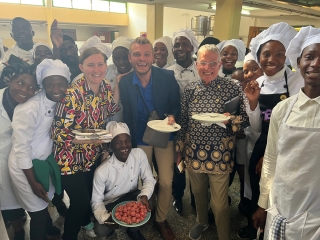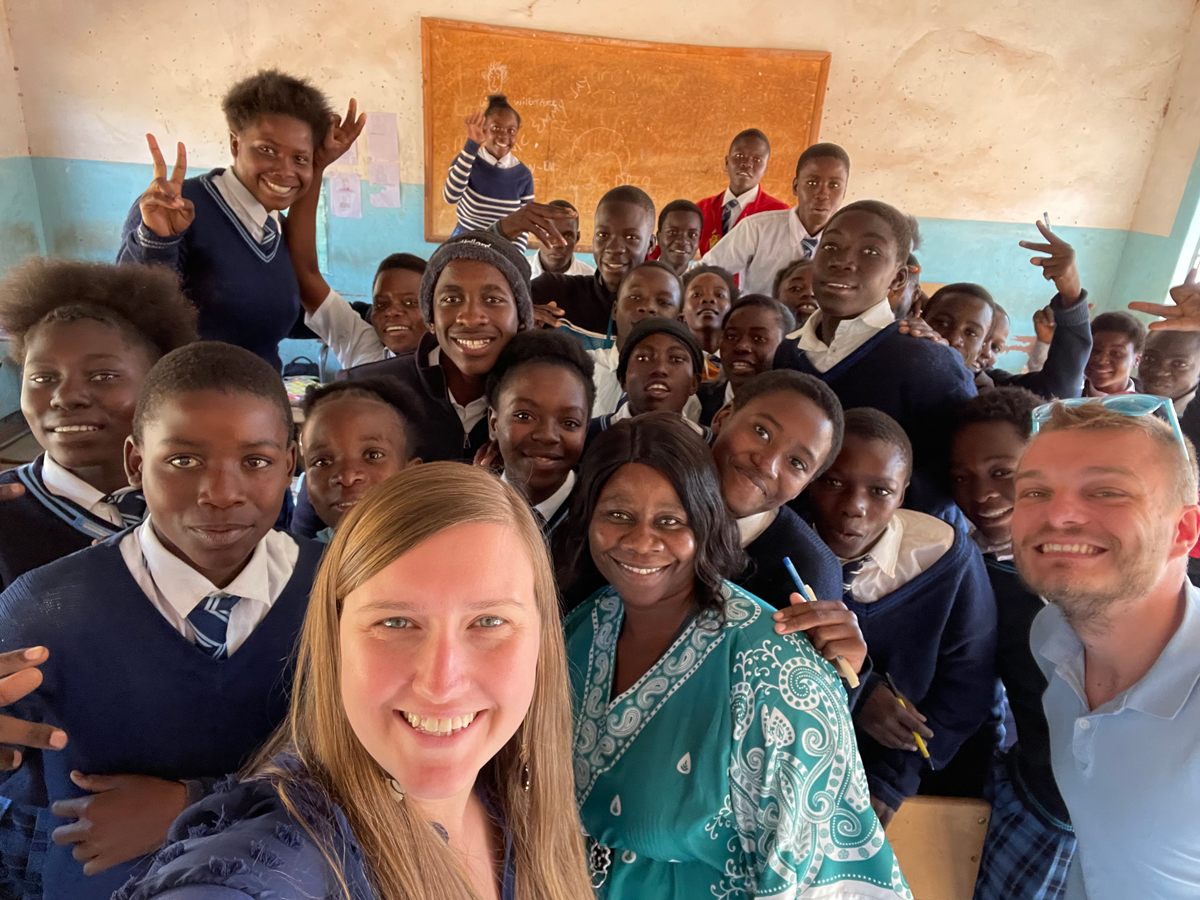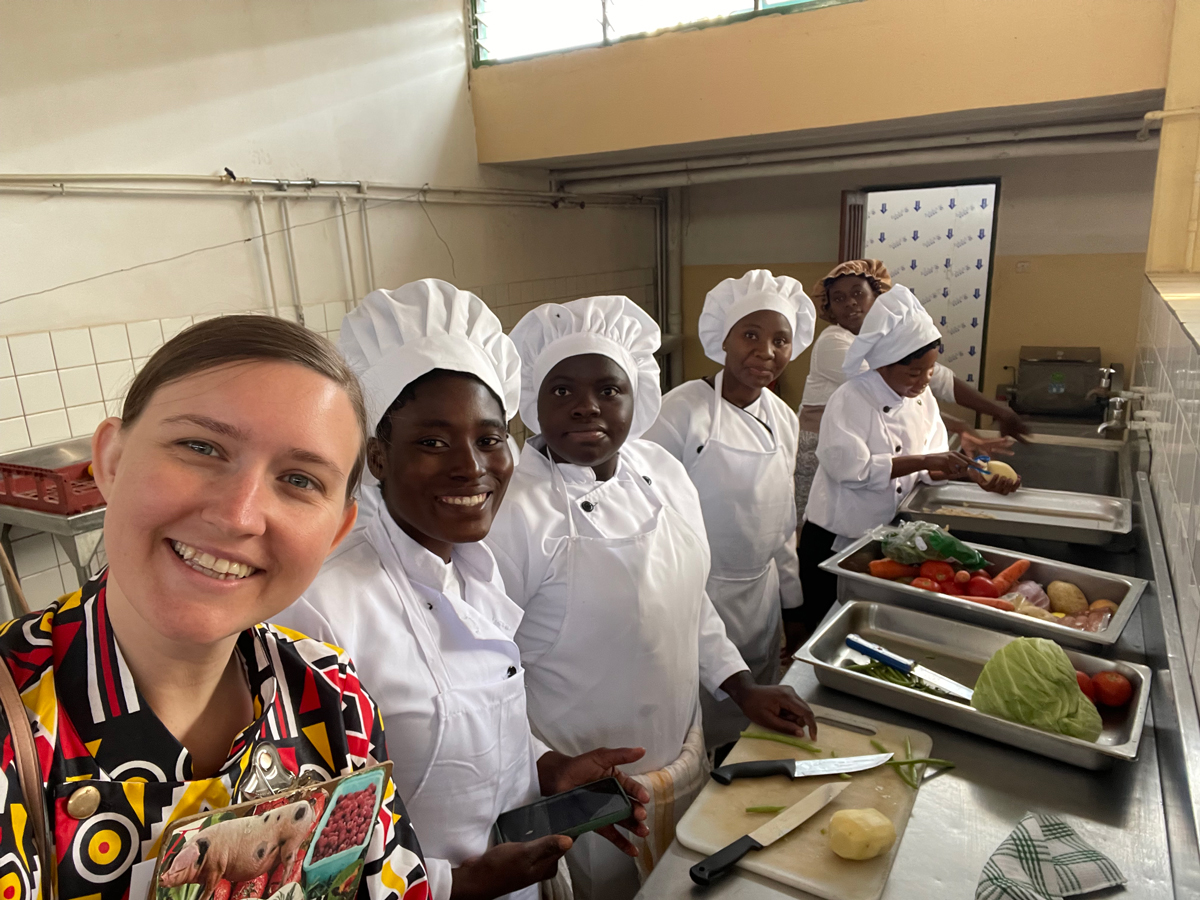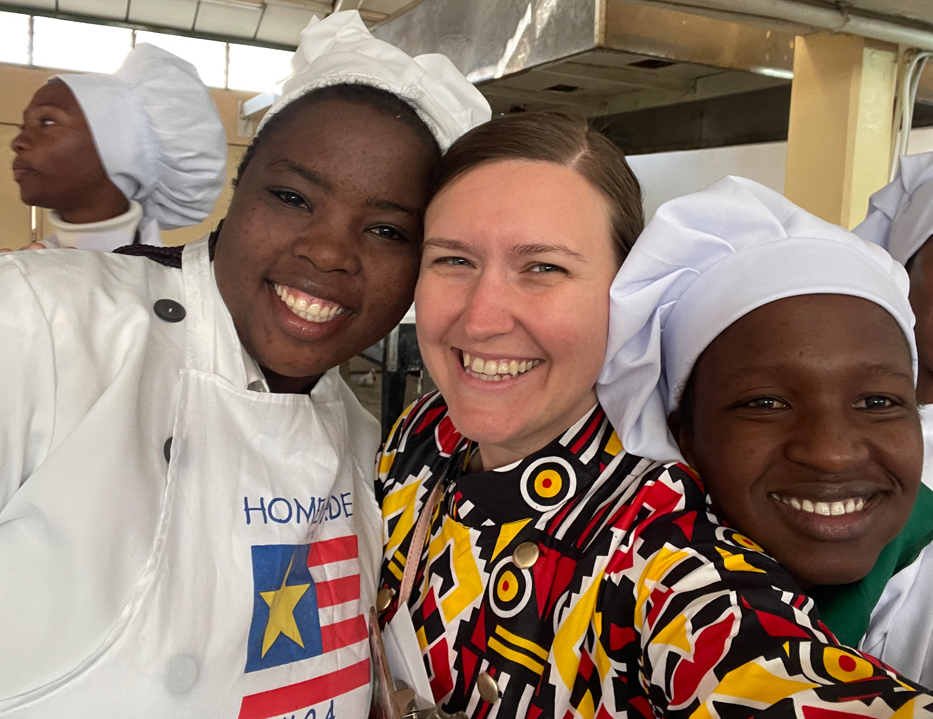
Teacher’s Study Abroad Program Opens Eyes and Hearts
02 October 2023Zambian people teach lessons that translate into US culinary programs.
By Lisa Parrish, GMC Editor and Elise Chonko, baking and pastry arts instructor at the Chesterfield Career and Technical Center at Hull Street in Richmond, Va.
Feedback & comments: This email address is being protected from spambots. You need JavaScript enabled to view it.
Global flavors, a global workforce and globalization of industries are examples of how the world is getting smaller as people integrate across international boundaries. Culinary education, as an example, has moved beyond teaching just the five French mother sauces to include flavors and cooking techniques from Asia to Argentina.
Culinary educators can teach students about global cooking, but what can these international countries teach our culinary students? What can our students gain when their lessons begin just beyond the kitchen door in another country?
One culinary educator traveled this summer to Zambia in southern Africa to discover what a developing country could teach her. Elise Chonko, a baking and pastry arts instructor at the Chesterfield Career and Technical Center at Hull Street in Richmond, Va., joined 12 other instructors for a month-long trip visiting schools, universities and businesses to learn about the Zambian economy and how their educational system supports the country.
As it turns out, some of the things she learned in Zambia – how they connect education to the economy, their entrepreneurial mindset and how they work together – can positively impact culinary education lessons taught here in the US.
Elise has agreed to write a series of articles for the Gold Medal Classroom featuring her experiences and how she is weaving the newfound knowledge into her classroom lessons. Read the first installment below.
Studying Abroad is Not Reserved for Students Alone
Culinary instructor Elise Chonko and her Zambia experiences
Part One: A study of an economy, educational system and culture
 I always regretted not studying abroad when I was in college. When our Continuing Education Department sent an email about a grant-funded study abroad experience for educators in Zambia, I knew right away I needed to apply. (Side note: Sometimes those annoying emails are actually worth reading!)
I always regretted not studying abroad when I was in college. When our Continuing Education Department sent an email about a grant-funded study abroad experience for educators in Zambia, I knew right away I needed to apply. (Side note: Sometimes those annoying emails are actually worth reading!)
I still remember receiving the email inviting me to be a part of the study abroad program. I looked like a fool jumping up and down and tearing up at the gas station by myself. I had no idea how life-changing this experience would be for me. A couple of months later, I joined the group of 12 high school educators and two Virginia Tech professors - all strangers – as we met at Dulles Airport late at night. We made small talk, trying to get to know each other, about to embark on the month-long experience of a lifetime.
The trip was so full, that we barely had time to allow jet lag to set in. Our goal was to gather data on the economy and educational systems in Zambia and how they are interconnected. To achieve this, we met with people from all walks of life, from the first female mayor of Livingstone to rural elementary students, from the King of a Mukuni village to the craftsmen he served. We took notes and reflected on each of their roles and experiences and how they shaped Zambian business and education.
In this article, I am providing an overview of what we did during this trip and briefly what I learned. The next few articles will dive deeper into the different lessons I learned.
Economy
Our home base in Zambia was the city of Livingstone, just a few miles down the road from the world-famous Victoria Falls, making it the tourist capital of the country. Due to its proximity to one of the seven natural wonders of the world, tourism was the city’s most important industry.
Naturally, most of the businesses we interviewed were part of this industry. Zambia has two types of businesses: formal and informal. The formal sector is made up of businesses that are officially approved by and follow the regulations set forth by the Zambian government to legally operate. The informal sector businesses are typically smaller and are not regulated by the Zambian government.
This setup would be frowned upon or punished in many other countries around the world, however these businesses operate with the blessing of the Zambian government as it is aware there are not nearly enough formal sector businesses to employ all of Zambia’s citizens. During our trip, we interviewed a wide range of business people from managers at luxury hotels, to business owners in the market, to village craftsmen. In this process, we learned what educational needs were required of its citizens to be successful in their economy.
Education
In our search for a better understanding of the educational system in Zambia, we met with a variety of figures in education including some introductory lectures about education from the District Education Board Secretary and others within the Ministry of Education. We also observed classes and interviewed teachers and students in elementary and secondary education as well as colleges and universities. With so little employment in the formal sector, Zambians rely on finding their own work. For this reason, education is centered around entrepreneurship and preparing learners to provide for themselves. These lessons include things such as raising livestock and tending to gardens. It was an incredibly exciting and interesting educational system, very different from what we teach in the United States. (Here, I constantly warn my students about the risks of opening their own establishment.)
 Culture
Culture
While not our number one mission, we inevitably were able to learn a lot about the Zambian culture both past and present by visiting museums, eating with local people, and shopping.
Historically, Zambians believed in the African philosophy of Ubuntu, which can be summarized by the phrase, “I am because we are.” It is the concept that an individual is strengthened by their community. Unfortunately, western influences are continually causing this belief to fall by the wayside. But, we were able to see examples of Ubuntu throughout our time in Zambia.
One example that comes to mind is of the craftsmen we met in the Mukuni village. Every day they came together to work on their crafts. Despite being each other’s competitors, they worked side-by-side and even shared resources. When we went to the market to shop for the goods they made, they were willing to help each other make a sale by helping to make change when their neighbor couldn't or showing another product that a competitor had for sale that might be more fitting for the customer. All these things clearly showed the spirit of Ubuntu; these men saw everyone’s sales could be higher by working together.
Closing
In the next few articles, I will be sharing some of the lessons I learned from this experience that I think will help you in your classroom. Topics I plan to cover include how Zambian educators and students used creative problem-solving to overcome barriers that would stop us in our tracks, how interacting with and learning about other cultures can help develop empathy in our students, and how the Zambian educational system has a major entrepreneurial focus and how that affects their lessons and their students.
I will end with a quick reminder to check those pesky emails that come from your department. You never know when a life-changing message will come into your inbox!
